North Carolina War Between the States Sesquicentennial
"The Sainted Women of North Carolina"

“The heroism of woman! How infinitely it surpasses that of man.
With all her gentleness, and tenderness and natural timidity, in nine cases in ten,
she has more nerve than the other sex, in times of great emergency. With a bleeding
and bursting heart, she is capable of putting on the composure, and loving serenity
of an angel, binding up the wounds of a husband or son, and when he is restored
to health and vigor, buckling on his sword anew, and returning him to the battle-field.
Glorious women of the South! What an ordeal you have passed through, and how heroically
you have stood the trying test. You lost the liberty which your husbands, sires, and sons
struggled for, but only for a period. The blood which you have infused into the veins of
future generations will yet rise up to vindicate you, and “call you blessed.”
Admiral Raphael Semmes
(Memories of Service Afloat, Semmes, LSU Press, pp. 79-80)
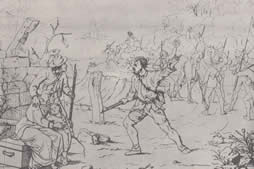
The New Reality in North Carolina
“After the first year of the war when Southern seaports were closed and there was no
exchange of cotton and tobacco in foreign trade we had to depend almost entirely on homemade
goods and supplies of all kinds, even for guns and all war ammunition. It was very difficult at times to
procure even salt; the people finally dug up the dirt floor in their smoke houses and extracted the salt there.
Our good women brought out their old hand looms, spinning wheels, cotton and wool cards which
had been laid aside for years, spun and wove dress goods for themselves, cloth for men and boys,
clothing, blankets, sheets, counterpanes, stockings, socks, and in fact almost everything to wear.
They made and “wore their homespun dresses with much grace” as the old Dixie song expresses it.
A great many things of necessity and especially of luxury had to be abandoned wholly; for instance,
parched corn, wheat and rye were substituted for coffee, home-made sorghum for sugar
and molasses. Sorghum was called “long sweetening.”
Pine knots and tallow dip candles, home-made hats for the ladies, their own make and fashion,
wool hats for men and boys made at home, wood bottom shoes and many other
substitutes were resorted to from necessity.”
(Reminiscences, A Sketch and Letters Descriptive of Life in Person County in Former Days, A.R. Foushee, pp. 64-65)
North Carolina Women of the Confederacy
“The women of North Carolina in the Confederacy possessed the same courageous and self-reliant
spirit that was inherited from this State’s Colonial and Revolutionary women, who acted with their
men in shaping some of the most important events in establishing the United States of America.
The spirit displayed by those women of the Confederacy was worthy of the wives and mothers of
the grandest heroes who ever fought on the field of battle.
In the War between the States, North Carolina has a proud heritage which should be handed
down to the remotest generation – for did we not give more men to the cause and lost more than
any other Southern State? The women of our State point with pride to the fact that
North Carolina was “First at Bethel, farthest at Gettysburg and
Chickamauga, and last at Appomattox.”
So much the greater pride we should feel for these women of our State of the Sixties, who are
much closer in blood to our women of to-day than those of one hundred and fifty years ago,
and we should pass on the individual story of the self-sacrifice and courage of
North Carolina’s woman of the Confederacy.
Their noblest eulogy is the simple portrayal of their character and work. The noble heroism of
these women showed itself in uncomplaining suffering, in loving ministration and in the
efficient discharge of arduous duties.
At the advent of war, our women had to take up the burdens dropped by the absent fathers
and brothers, and, with real ability, they assumed control of plantations, stock and slaves,
financed the homes and industries of the State. Many women of wealth joined the poorer
women in tilling the fields and reaping the harvests, as many of the slaves joined the Federals.
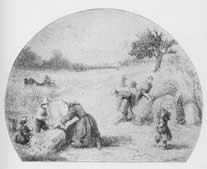
The fact that these women, in great part, kept the State fed attests their ability, and during the last
months of the war, almost the entire army of General Lee was fed by North Carolina.
Every community had its soldiers aid and knitting societies, and each mother, wife, sweetheart, and
sister looked after her own dear ones on the field, and constantly sent comfortable clothing and
boxes of food to them from their own depleted larders . . . The story of the ingenious devices
and clever makeshifts to supply needful things during the years of blockade and non-production;
the ills and atrocities of reconstruction; the records of Soldiers’ Aid Societies, Wayside
Hospitals, and Memorial Associations; sketches of everyday life in the Confederacy –
its lights and shadows, fun, work, jokes, songs, costumes and fare – all these are of
great value in preserving for a history of these women in each section of North Carolina.
It was left to that knightly soldier, Col. Ashley Horne, of Clayton, to erect, in 1914, the only
monument in North Carolina to the women of the Confederacy. This beautiful memorial stands
in the Capitol grounds at Raleigh as a faithful witness to the sacrifice, heroism and loyalty of
our women of the sixties. This “hero in times of war and patriot in times of peace,” in giving
this monument to the State said: “The silent women of the Memorial will typify
the uncomplaining woman of the Confederacy.”
In accepting this memorial for the State, Governor Locke Craig said, “This statue is epic.
Its theme is heroism and devotion; the inheritance of the children of the South. The bronze
group represents the grandmother, unrolling the eager youth, grasping the sword of the
father, the scroll of the father’s deeds. The statue is illumined with unfolding meaning.
Women of the Confederacy, henceforth all generations shall call you blessed.”
On December 9, 1863, in a Resolution by the General Assembly the following is incorporated:
“Equal to our appreciation of the valor and patriotism of our troops in the field is our admiration of
the self-sacrificing and noble devotion of the women of our country in encouraging the soldiers on
the way to the field of duty, and of danger; in their untiring efforts to supply them with every comfort
which their ingenuity can invent, and their indefatigable ministrations at the couch of the suffering,
whether it be by disease or by wounds received in defense of their country.
This devotion to the cause of independence for which we are struggling is alike sustaining to the soldier
on duty and the patriot at home and inspired all with that energy which enables us to work with
confidence to its successful termination and in a Confederate Government established upon
an equitable basis and entitled to the higher possible position among the nations of the earth.”
(NC Women of the Confederacy, Confederate Veteran, October 1930, pp. 374-376; excerpts from book by Mrs. John H. Anderson)
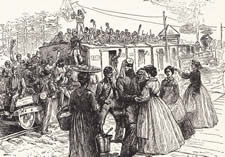
[Continued]
“Executive ability was displayed by so many of our women in those critical days. This characteristic
was shown to a marked degree by Mrs. Jonathan Worth, of Asheboro, who was one of the
“Inventive Women of the War.” Her husband had equipped an entire company from his county
at his own expense, and Mrs. Worth herself oversaw all the garments made for these men.
Throughout the war she paid numbers of needy women in that vicinity to sew and knit for this company,
this not only providing them with a livelihood, but giving them happiness in working for their own
husbands and fathers. Whenever soldiers passed through the town, Mrs. Worth would have her servants
go out and gather up the discarded socks left by the soldiers. After having them washed in steaming tubs,
she would employ soldiers’ wives to knit new feet on these clean socks, shipping them to the soldiers at the front.
In 1862, when Mr. Worth became State Treasurer, under Governor Vance, Mrs. Worth shared the
responsibility of caring for the State’s books, and later, when he was Governor of North Carolina,
she courageously went through the terrors of reconstruction days by his side. By her dignity and
good sense, she saved the day in many instances when the Yankee hordes were terrorizing Raleigh.
The memory of Mrs. Margaret Ann Cromwell, a sainted woman of the Sixties, remains like a benediction
to those who remember her wonderful personality and activities during the war. She showed her heroic
ancestry when she sent with a cheerful smile, her young husband, Elisha Cromwell, to fight for the
Confederacy, then with an aching heart she went to work to do her part for the South and her soldiers.
She was a helpmate in truth, assisting Colonel Cromwell in organizing his regiment.
Besides managing her large plantation, Margaret Cromwell was the mother of the company of boys
her husband carried to the war, spinning and weaving clothes, knitting, and in every way ministering to
their comfort. Mrs. Cromwell was known throughout her native county and adjoining counties as a woman
of strong character, and although reared in affluence, when the dark days of war came, she ministered
to the needy families of her soldiers. Her self-forgetfulness gave inspiration to others, and to all
she came in contact with she was a constant blessing.
Her granddaughter, Mrs. Jackson Daniel Thrash Morrison, was one of the beloved Presidents of the
North Carolina Division, [United Daughters of the Confederacy].
Like Mrs. Cromwell in incessant work for the Confederacy, was Mrs. Tempie Ann Battle Marriott,
of the same vicinity. Her husband, Dr. Marriott, not being physically able to serve in the army,
did more than his share as physician and chief advisor to the people of Nash and Edgecombe
counties. Mrs. Marriott did everything possible to aid the cause by raising great quantities of
provisions to feed her county’s soldiers.
She kept many of them clothed by her own work of spinning, weaving and sewing. One of her four
soldier brothers died of fever, but, though heartbroken, this woman of the sixties worked all the
harder for her beloved South. Her spirit of endeavor was handed down to her granddaughter and
namesake, Tempie Whitehead Holt, another beloved President of the North Carolina Division, UDC.
Mrs. Robert Ransom, the wife of one of North Carolina’s distinguished generals, was a wealthy
woman who came South with her husband from Washington City. She gave of her means to help
General Ransom equip the First North Carolina Cavalry, which he raised and trained in Ridgeway.
All during the war Mrs. Ransom sent boxes and did work for the sick soldiers. Many of her dozens of
suits of linen underwear, linen shirts, etc., she scraped to make lint for the hospitals. She lived with a
most hospitable family, five miles from Petersburg, and a large four-room office was always filled
with sick soldiers whom she and the mistress of the hospital nursed. She would go to the other
hospitals and write letters home for the men, and alas! too often writing to tell of their death.
Her daughter, our Mrs. Fannie Ransom Williams, had a letter from President Davis, thanking
her for a box of provisions. She shipped boxes of honey from Maj. John Browning’s farm,
where she refugeed in 1864. After the war, in 1866, she opened a large school in Wilmington,
and, while she was in charge of this, she wrote President Davis, asking him to send his
oldest daughter, Maggie, and allow her to educate her.
To her death, Mrs. Ransom loved the South. Her agony over her husband’s absence in the war
was increased by the knowledge that her only brother and her only sister’s husband were on the
other side, and she dreaded them ever meeting.
One of the most beloved and honored of the North Carolina women of the Sixties was
Mrs. William M. Parsley (Eliza Hall Nutt) of Washington, “Mother” and organizer of the
North Carolina Division, UDC. Mrs. Parsley was made a widow of the Confederacy on April 6, 1865,
her gallant Colonel husband being killed three days before the surrender.
States’ rights, patriotism, and duty were her watchwords, and she continued after his death to live
up to these principles. She realized it was her duty to help the wornout and disabled soldiers, to
encourage those who came from the war disheartened, to give them comfort and help them begin
life anew. Knowing there were many worse off than herself, she asked her father to help them,
and accepted a position in a school, where she began the education of her two little girls.
In December, 1894, she organized the Cape Fear Chapter of the Daughters of the Confederacy,
and in April, 1895, she organized the North Carolina Division of the United Daughters of the Confederacy,
being unanimously elected its first President.
Chapters and individuals went to her for guidance and she urged all to teach the coming
generation correct history, that the Southern soldiers were heroes and not traitors. She was literally
a “Mother of the Confederacy,” for she had loved, and suffered and lost. Her life was a benediction
to many a soldier, for she fully understood the incomparable privations of a Southern soldier’s life.
She gave her gallant husband to the cause and her very last years in work for her beloved Confederate veterans.
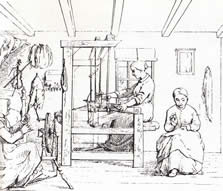
Mrs. Armand J. DeRosset (Eliza Lord), of Wilmington, was one of our women of the Sixties who
was endowed with such administrative ability that it was often said that she should have been
a general. Under her direction the Soldiers Aid Society was early organized, and for four years
did its work with unabated energy.
While her six sons were fighting, Mrs. DeRosset assisted her husband in his medical work,
nursing the sick, being keenly active to the needy. With the valuable assistance of the women
of Wilmington, especially Mrs. Alfred Martin, who was Vice-President, large supplies were made
and kept on hand. Canvas bags were made to fill with sand and used in the fortifications at
Fort Fisher. Canteens were covered, haversacks made, also cartridges for rifles, and powder bags
for the great Columbiads were made by the hundreds.
Mrs. DeRosset had a large room in her own home fitted up as a store room, seizing every chance
to secure supplies through the blockade. Many a soldier blessed these women for comforts bestowed
on them. Men who still live treasure the War Bibles given them as among their most valuable possessions.
They nursed through the harrowing scenes of hospital life, and tenderly buried the dead. When all was over
this band of faithful women, in July, 1866, organized a permanent memorial association, with the purpose
of rescuing from oblivion the names and graves of the gallant soldiers who are buried in and near Wilmington.
The most unusual tribute is given to a plucky woman of the Sixties of Wake county, being an inscription
on her tombstone. She lies buried in a little church yard at Fuquay Springs, near Raleigh.
This is the inscription:
“Here lies Eliza Ann Jones, A devoted Christian Mother, Who whipped Sherman’s bummers,
While trying to take her dinner Pot, which contained a hambone being Cooked, for her soldier-boy.”
The “First Lady” in North Carolina during the greater part of the Confederacy was Mrs. Zebulon Vance,
wife of our beloved War Governor. This frail little woman helped to equip companies and went through
these terrible days by the side of her courageous husband, helping to inspire him with
strength to guide wisely his “Ship of State.”
In unwavering faith, high spirit, strength, courage and steadfastness or principle, she was an
example to all other women of the State who were suffering and enduring.
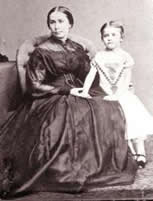
Though most modest and retiring in her nature, yet Mrs. Anna Morrison Jackson, of Charlotte,
stands out among our fearless women, not only for herself but as the wife of our immortal
Stonewall Jackson. She gave to the Confederacy her distinguished husband, whom she followed
in many a battle, almost being in the fighting herself.
After the War, Mrs. Jackson showed the spirit of her noble husband by helping to keep green
the memory of the Confederacy in her memorial work, and later in the UDC, being Honorary President of this Division.
After awhile, when every male, both old men and young boys, were fighting in the defense of their homes,
the young women were taken in at military posts to do the work that a young man might do (as a
stenographer of the present day). Early in 1864, the positions of clerk or copyists were offered
to four gentlewomen, Misses Campbell, Stedman, Taylor and Ellison, at the Fayetteville arsenal,
where the officials treated the young women clerks as honored guests.
They remained there ‘till Sherman’s army, in March 1865, destroyed every building on the arsenal
grounds. As there was no money, the pay given these young ladies was black alpaca, which was
kept in the arsenal to use in some way to make cartridges. The alpaca, combined with scraps of
colored silk, made most elaborate dresses for these girls.
Another young woman whom North Carolina claims, who took a man’s place in the service of the
Confederate Government was Miss Isabel Gill. Miss Gill served in the Confederate Treasury
Department and her signature is on many of the Confederate bills which are now treasured relics.
Her quick intelligence and fitness made her a valuable worker, and her service was highly
commended by the Confederate authorities.
The Children’s Chapter of the Daughters of the Confederacy at Newton, N.C., is named in honor
of this young woman, who, at the close of the war, married a Confederate soldier of that town,
Sidney Wilfong, one of four brothers in the Confederacy.
Some of the younger women kept diaries during the Sixties, and that kept by Miss Mary Ashe
is a noteworthy record of the life of a young girl during these terrible four years. This girl of
nineteen (when the war began) was one whom those who knew her put almost on a pedestal,
and her diary shows her personal emotions with her prayers. It deserves preservation as
indicating life among North Carolinians at this period, and is illustrative that North Carolina
women presented an example never surpassed.
Miss Ashe tells of her first war days spent in the country, at Rocky Point, near Wilmington,
with her invalid mother and young sister (herself a delicate girl). Her father, the Hon. William S. Ashe,
was in the Confederate service at Richmond, having charge of the important duties of army
transportation from the Mississippi to Virginia; one brother, Maj. John Grange, at first with
General Bragg at Mobile, and then in Lee’s army; and the other brother, Capt. Samuel Ashe,
our State’s distinguished historian, also in the active service of the Confederacy.
The first sorrow mentioned in this interesting diary was the tragic death of her father, from a
railroad accident, September 1863. At this time the diary records the imprisonment in Washington City
of the brother, Samuel. After a hard winter the next grief recorded is the death of the invalid mother.
Miss Ashe tells how the good God provided for her and her little sisters, and, at length, when her
brother Samuel was ordered from the front (unsought by him) to the position of assistant to the
commanding officer at the Fayetteville arsenal, here the brother made a home for his young sisters,
who busied themselves in activities for the soldier boys with the other ladies of the town.”
(NC Women of the Confederacy, Confederate Veteran, November 1930, pp. 419-421)

Sources:
NC Women of the Confederacy, Confederate Veteran, October/November 1930, excerpts from book by Mrs. John H. Anderson
Reminiscences, A Sketch and Letters Descriptive of Life in Person County in Former Days, Alexander R. Foushee, 1921
Memories of Service Afloat, Semmes, LSU Press, 1868/1996
Copyright 2013, The North Carolina War Between the States Sesquicentennial Commission